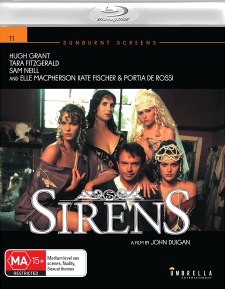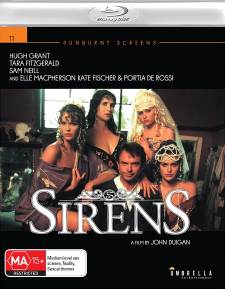Sirens (Blu-ray Review)

Director
John DuiganRelease Date(s)
1994 (October 1, 2021)Studio(s)
Roadshow Films/Miramax (Umbrella Entertainment – Sunburnt Screens #11)- Film/Program Grade: B+
- Video Grade: B
- Audio Grade: B+
- Extras Grade: B+
Review
[Editor’s Note: This Blu-ray release is REGION-FREE.]
Sirens is writer/director John Duigan’s charming and whimsical comedy about the intersection between the strictures that organized religion has always tried to place around human sexuality, and the unbounded reality of what sexuality represents. Duigan was inspired by the Australian artist Norman Lindsay, who was a painter, sculptor, and writer. (Lindsay’s novel The Age of Consent was adapted into a 1969 film by Michael Powell.) Lindsay’s art drew controversy for the robust earthiness of his nudes, and also for the blasphemous nature of his religious imagery. Sirens is a work of fiction, but it’s loosely based on the real-life controversies that Lindsay inspired.
Tony (Hugh Grant) is an Anglican priest who is sent by the church to visit Lindsay’s estate after the artist exhibits a scandalous representation of the crucifixion. Accompanied by his wife Estella (Tara Fitzgerald), the two find themselves asea in the bohemian world of Lindsay (Sam Neill) and his alluring nude models (Elle MacPherson, Portia de Rossi, and Kate Fischer), as well as Lindsay’s equally unrestrained wife Rose (Pamela Rabe). When repression and free expression collide, something has to give.
Duigan fills the screen with fairly obvious symbolism, with snakes guiding the temptations, the Titanic showing the clear and present danger, and characters eating apples. It’s not subtle, but it’s still one of the film’s many charms. Despite the abundant nudity and sexuality on display, the Edenic setting and imagery in Sirens gives everything an oddly innocent quality, without ever appearing prurient. The myriad of temptations on display never reek of corruption, but instead end up speaking to liberation.
Duigan’s sympathies are clearly with the freedom exhibited by Lindsay’s clan, but he treats Tony and Estella no less sympathetically. At the conclusion, their eyes may be opened, but everything that they’ve experienced strengthens their relationship, rather than harming it. As a couple, they haven’t been defiled; they’ve been emancipated. Duigan’s perspective is that of the real Lindsay, who when he was accused of violating popular morality, responded that “I wasn’t doing anything of the sort. I cared for nothing but to express myself.” Sirens expresses itself through the self-expression exhibited by all of its characters. It’s a liberating experience for viewers as well.
Cinematographer Geoff Burton shot Sirens on 35 mm film using spherical lenses, framed at 1.85:1 for its theatrical release. There’s no information regarding the elements that were used for Umbrella Entertainment’s Blu-ray version, but it’s likely a secondary source such as an interpositive. Detail is a bit soft, though that’s partly due to the occasionally diffuse cinematography—Burton was going for a gauzy, hazy look in many shots. On the other hand, some DNR has been applied as well, which does soften things more than they should be. There’s still light damage throughout, mostly in the form of speckling, but there are a few large scratches visible such as one on the left side of the screen when Tara Fitzgerald returns to the swimming hole at 45:30. Contrast can be a bit flat as well, with inconsistent black levels. The colors look natural, with accurate flesh tones (including Fitzgerald’s ethereally pale skin) and lush greenery around the Lindsay estate. It’s an adequate transfer, though one with room for improvement.
Audio is available in English 2.0 DTS-HD Master Audio, with optional English subtitles. Sirens was released theatrically in Dolby Stereo, so this is a four-channel matrixed mix. It’s still largely focused on the front channels, especially the center, with the music providing most of the stereo spread. There are limited ambient effects that creep into the surrounds, such as birds, insects, and thunder, but most of the energy stays toward the front. The real star of the show is Rachel Portman’s lovely score, which sounds wonderful here (there’s also an occasional use of source music in the film, such as March Past of the Kitchen Utensils by Ralph Vaughan Williams during the opening scene).
Umbrella’s Region-Free Blu-ray for Sirens is #11 in their Sunburnt Screens line. The insert is reversible, with one side omitting the mandatory Australian “MA 15+” classification from the front cover artwork, and also substituting the theatrical poster art for the back cover blurb. Most of the extras are taken from their 2010 DVD release of the film, with one addition:
- Audio Commentary with John Duigan and Sue Milliken
- Producer Sue Milliken in Conversation with Paul Harris from 3RRR's Film Buffs Forecast (HD – 32:46)
- Informal Home Movie Chat between Hugh Grant and Director John Duigan (Upscaled HD – 19:32)
- ABC Lively Arts Interview with Norman Lindsay (Upscaled HD – 55:49)
- Theatrical Trailer (HD – 1:50)
- Stills Gallery (HD – 40 in all – 4:44)
The vintage commentary with director John Duigan and producer Sue Milliken is a laid-back affair, with gaps throughout, but the two do have plenty of interesting things to say about their film. They discuss all of the actors, noting that Grant has always had impeccable comic timing, and also cover the cinematography and the production design. They talk about the guilty pleasure in all of the “sledgehammer symbolism” that Duigan included, which he finds to be an essential part of the film’s humor. They also note the visual allusions in the film’s composition, and give numerous details about the inspirations that they derived from the real Norman Lindsay’s life, including the controversy over his paintings. (Animal lovers will be happy to learn that in the shot of a truck heading directly toward a koala, the bear ran straight out of the shot and back into the safety of Duigan’s arms.)
The audio-only 3RRR Film Buffs Forecast is the one new feature on this disc, though it was originally recorded during the theatrical release of Sirens back in 1994. Milliken discusses Duigan’s interest in John Lindsay, and the path that it took to bring this offbeat story to the screen. She talks about practical details like financing and casting, as well as shooting in the Australian Outback. She also relates her experiences working with Bruce Beresford, including their aborted version of Total Recall. Roberts is a skilled interviewer, and he adds valuable observations along the way.
The Informal Home Movie Chat is lighthearted conversation with Duigan ostensibly interviewing Grant, but it’s really more of a back-and-forth between the two. They tell amusing stories about the production, and also look at the trajectory of Grant’s career. (Best moment: Duigan saying that the profane old man in the pub was the best actor that he’s ever worked with.)
The ABC Lively Arts Interview was filmed at Lindsay’s Springwood Estate in 1965, and Lindsay being Lindsay, it’s a lively interview. (If anything, Sam Neill almost underplays him.) Some of the dialogue in the film is more or less verbatim from this interview, including Lindsay’s views about the naked human form, and his disdain for the story of the crucifixion.
Sirens might not be everyone’s cup of tea, but it’s a witty look at the irresistible force of human sexuality meeting the immovable object of religious dogma. The last time it was released on physical media in North America was via a barebones non-anamorphic DVD, so thankfully Umbrella has given it the love that it deserves, and Region-Free as well.
- Stephen Bjork
(You can follow Stephen on social media at these links: Twitter and Facebook.)

